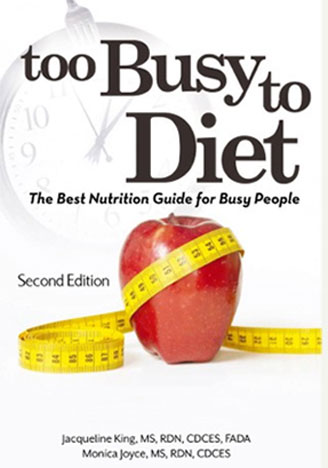Diabetes Corner: Learning Your ABCs
in The Too Busy to Diet Blog on February 6, 2014

Written by Teri R. Belisle (Giordano), PharmD, RD, LDN.
Many of you already know that February is American Heart Month– a month dedicated to heart disease awareness, education, and prevention. But did you know that having diabetes makes you two times more likely to develop heart disease than someone without diabetes? It’s true. Managing diabetes is more than just counting carbs and checking your blood sugar. Taking care of your heart is also very important. Working with your doctor to lower your risk for a heart attack or stroke is as easy as learning your ABCs!
A: A1C
- A1C is a test that your doctor can perform to determine your average blood sugar level over the past 3 months. For most people with diabetes, the goal A1C level is below 7% (higher levels may be appropriate for some people, as determined by your doctor). A1C can tell the doctor how well your diabetes is being controlled and whether changes need to be made to your treatment plan. Things such as not tracking how many “carbs” you are eating, forgetting to check your blood sugar regularly, and skipping medications such as insulin can increase your blood sugar and raise your A1C level. Having an elevated A1C level over a long period of time can cause damage to your blood vessels which can increase your risk for a heart attack or stroke.
B: BLOOD PRESSURE
- Blood pressure measures the amount of force applied to blood vessel walls as blood passes through them. The goal blood pressure level for a person with diabetes is 130/80 mmHg. Several factors can raise blood pressure including too much stress, certain drugs, obesity, and an unhealthy diet – especially too much salt/sodium, alcohol, and caffeine. Elevated blood pressure over a long period of time can damage blood vessel walls and increase your risk for heart attack and stroke.
C: CHOLESTEROL
- Cholesterol is a wax-like substance found in the fats of your blood. Not all cholesterol is bad. In fact, our bodies make some of its own cholesterol which is needed for certain brain and cell functions. Other cholesterol is found in foods such as cheese, egg yolks, beef, and pork. Foods containing cholesterol do not need to be completely avoided, but individuals should limit their intake. Having too much cholesterol in your blood can decrease blood flow to your heart and brain and increase your risk for heart attack and stroke. When your doctor checks your cholesterol he/she will look at four numbers:
- Total cholesterol (goal: less than 200 mg/dl)
- Triglycerides ( goal: less than 150 mg/dl)
- LDL or ”bad” cholesterol (goal less than 100 mg/dl)
- HDL or “good” cholesterol (goal more than 40 mg/dl for men, more than 50 mg/dl for women)
High blood pressure or high cholesterol can be unhealthy for anyone’s heart, but when high blood sugar (elevated A1C) is added to the mix it can be a dangerous combination with dire consequences. If you haven’t seen your doctor in a while, or you are unfamiliar with your “ABCs”, now is a perfect time to make an appointment and protect your heart. It could save your life!
Keep following our page for several heart-healthy tips and recipes during the month of February, and check out the Too Busy to Diet book for even more information.
Buy the Too Busy to Diet book
Get your copy of the definitive diet reference guide and healthy eating book today. Stop reading those misleading fad diet books and read an easy to follow book on how to lose weight and keep it off from actual Registered Dietitians.

Recent Posts
- Barbeque Turkey Meatloaf
- Pescado a la Veracruzana
- Juicy Pork Chops
- Rotasserie Chicken Casserole
- Grilled Salmon & Blueberry Salad